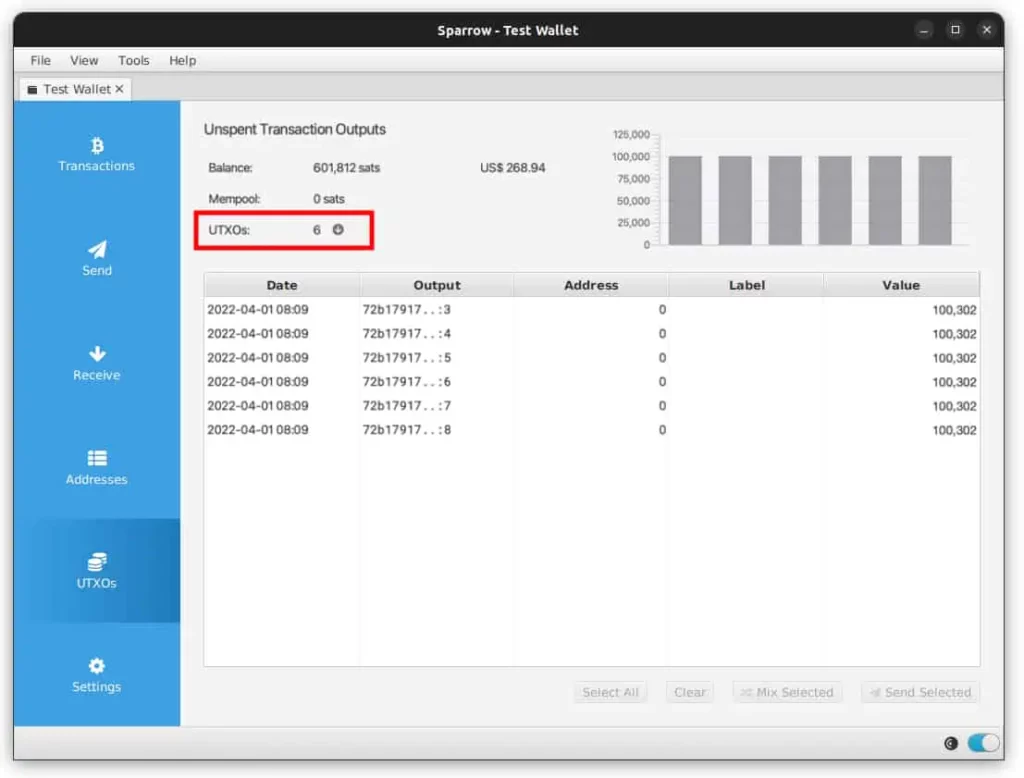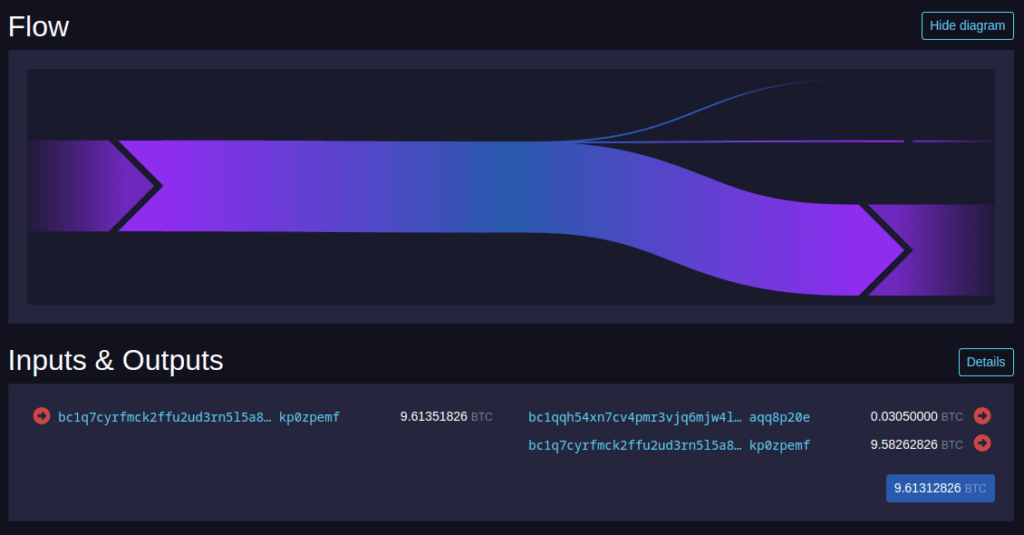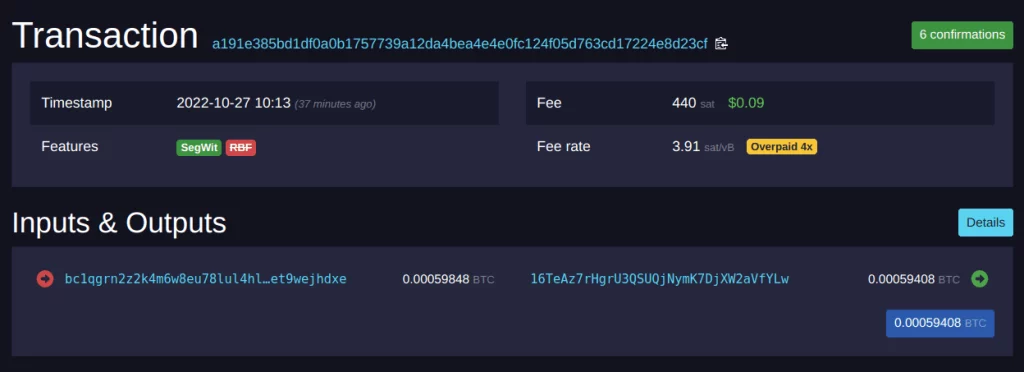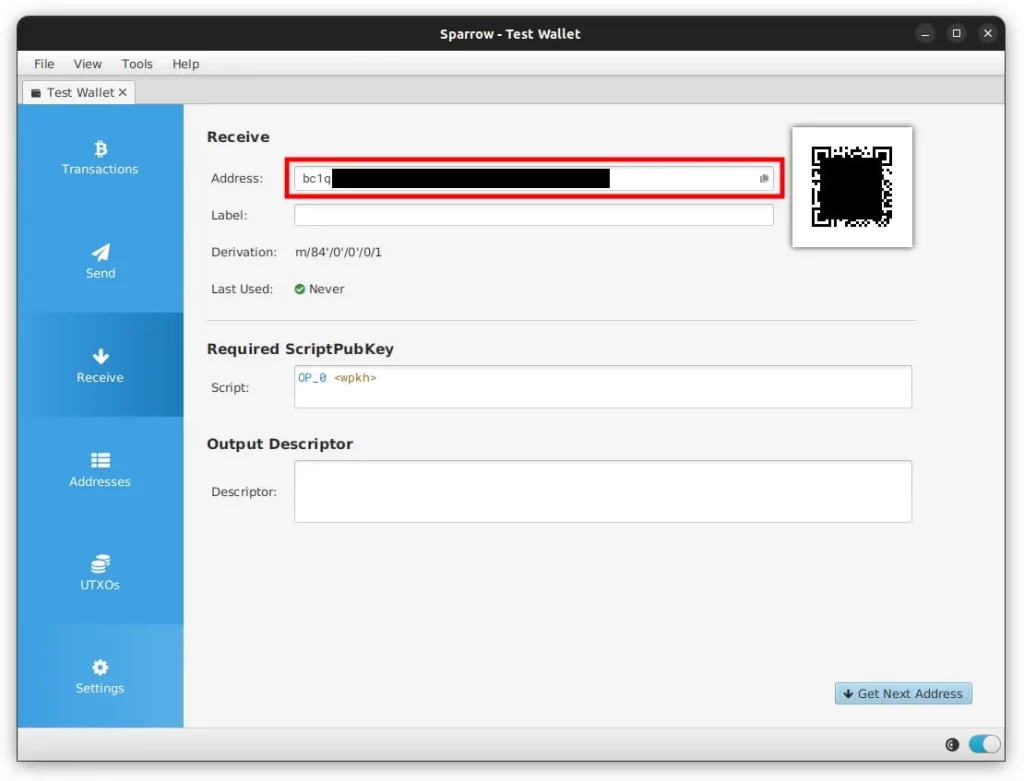If you’re new to Bitcoin you might have noticed that your addresses keep changing all the time. It’s understandable that you might be worried, but properly answering the question of why does your bitcoin address change actually requires a bit of in depth information on how Bitcoin works.
To start with though let’s just answer the simple parts of this question.
Contents
What Is A Bitcoin Wallet Address?
A Bitcoin Address is a string of 26-35 alphanumeric characters that’s used to receive bitcoins.
eg: bc1qelem0ann687r2e9jax542lja7q8cu8s35h96pc
When sending any payment you always need to know where you’re sending it to. When using the Bitcoin network this “where” is represented by a unique address. Bitcoin Wallet software is able to generate essentially infinite addresses for no cost and they are sometimes also represented as an easy to scan QR code. It goes like this:
- Wallets manage and store your Private Keys
- The wallet software uses your Private Key to create your Public Key
- The wallet software uses your Public Key to create your Bitcoin Addresses
Why Does Your Bitcoin Address Change?
Your Bitcoin wallet address can change due to two reasons which we’ll dive deeper into below, but you should know that it’s completely normal and safe. It’s a security measure provided by your wallet software and is done for your safety and greatly increases your privacy so there’s no need to worry.
Each time you receive bitcoins you should see a new address and this is OK. When you spend those funds, any leftover funds that you receive from the transaction will also be sent to a brand new “change” address too, again this is totally normal and OK.
Now, if you’d like a full explanation of why this happens we have to get into the weeds a bit on how Bitcoin works. To start with you need to understand what a UTXO is.
What Is A UTXO?
In Bitcoin UTXO stands for Unspent Transaction Output. Each UTXO is a discrete, single output or spend that comes from a Bitcoin transaction.
UTXOs are uniquely identifiable and indivisible, so you cannot spend part of a UTXO, you must spend all of it. They are also destroyed completely when they are spent.
All Full Bitcoin Nodes on the network keep track of all spendable UTXOs. When you add up all of the current UTXOs you get the total supply of all bitcoins on the network.
Once a UTXO is consumed in a transaction, it no longer exists in this set of spendable UTXOs. If you tried to send funds to an address of a spent UTXO, the transaction would be invalid and rejected by the network. This is because it’s an attempted double spend and the network won’t accept it
UTXO Vs Addresses
When a new wallet is created by your wallet software it generates a new address and, once funds are sent to it, a new separate UTXO is created for this transaction. If you ever send bitcoin to an address that’s already had funds sent to it, then a second UTXO for that same address is created.
This is called address reuse and is bad for reasons we’ll get into below. Due to these bad reasons, most modern wallet software will create a fresh, unused address ready to receive the next lot of funds in your wallet.
This is the first reason why your address can change. It’s not that it’s changed, your existing address is still there in your wallet, it’s just that your wallet software is now showing you your next address to send funds to.
Separate to these addresses, your wallet will also have a number of UTXOs available to spend. It’s important to understand what a UTXO is and how they are different to addresses because Bitcoin uses what’s called the UTXO Model.
UTXO Model Vs Account Model
Regular fiat bank accounts as well as other cryptocurrency networks such as Ethereum or Ripple use what’s called the Account Model. This means you have a single account, usually with an account number, and that account is what’s used to send your funds to. It doesn’t change over time and is what most people are used to.

Bitcoin uses a different accounting model called the UTXO Model. In the UTXO model there are no “accounts”. When you open your wallet software it finds all the UTXOs that your bitcoin wallet private keys has control over and displays them. All these UTXOs get added together and the result equals your total balance.
Why Is Bitcoin Setup This Way?
While the Account Model will likely be a lot more familiar to most people, the UTXO Model allows for greater privacy, transparency and auditability.
For example, no one can do a full audit of all the bank accounts in the US where as auditing the Bitcoin network is done every 10 minutes by every Full Bitcoin Node. The UTXO model also allows for much more privacy as it’s free and easy to generate virtually unlimited Bitcoin Addresses.
Each of these addresses can store any number of bitcoins and by default, there’s no connection between each address as viewed by an outside party. Compared to the legacy financial system and the Accounts Model, users are usually forced to keep all their funds in a single account that’s tied to their identity.
Inputs, Outputs & Change Addresses
As UTXOs are indivisible, if you wish to spend part of one most wallets automatically create a new bitcoin change address for the transaction. This is the second reason that your address can change.
For example, if you have 9.61351826 BTC in a single UTXO and you want to send 0.0305 BTC to your friend, you’d likely want the remaining change. This is what’s happening below.

We can see that the input for this transaction which is on the left (9.61351826 BTC) was a UTXO. Now that it has been spent, that UTXO is destroyed and the bitcoins are transferred to the two new UTXOs on the right hand side (0.0305 BTC + 9.58262826 BTC).
The new 9.58262826 BTC UTXO is the change address and obviously, this is a completely new address that’s different to the original 9.61351826 BTC one.
Should You Use The Same Address Or A New Address?
You should always use a new address each time you receive bitcoin. Address reuse is terrible for your privacy and security which is why good wallets automatically give you a new one each time, but why?
The addresses that are assigned to the input and output, as well as the entire transaction itself, are all publicly viewable on the Bitcoin Blockchain.

So let’s imagine you regularly buy Bitcoin and each week (foolishly) send it to the same single address. After a while you have 10 BTC in it, all with separate UTXOs. Now imagine you want to pay someone 0.01 BTC. Your wallet creates a new transaction using one of the many UTXOs in the 10 BTC address as the input and the 0.01 BTC as the output to the other person.
This person can now look on the public Bitcoin blockchain and see that it came from an address with tons of other UTXOs in it, all totaling 10 BTC! They can essentially see your entire wallet balance!
When you spend funds from an address, it’s also often the case that the receiving party knows your real world identity. So now the person knows who you are, potentially where you live and that you have control over 9.99 BTC, that’s a massive risk for you and your family now.
If instead you send each of your bitcoin purchases to a new, separate address each week, you can then use Coin Control to chose a single UTXO to send this person your 0.01 BTC. If the person looks at the transaction, all they know is that you had 0.01 BTC and you sent it to them, nothing more.
Other reasons why you shouldn’t reuse addresses also include that it can decrease other peoples privacy, make it easier for Chain Analysis firms to track and de-anonymize your other transactions and can lead to privacy issues as it makes it easier to associate multiple transactions with a single entity
How To Generate A New Bitcoin Wallet Address

Most modern (and secure) Bitcoin Wallets will automatically create new addresses for you using a standardized process (BIP-0032 / BIP-0039 / BIP-0044) and keep track of your old previously used addresses. Previous addresses that haven’t been spent still remain valid, however if you continue to send bitcoins to them they reduce your privacy.
FAQ
What Address Type Should You Use To Send And Receive Bitcoin Transactions?
Generally the best address type you should use is the Pay To Witness Public Key Hash (P2WPKH) type. Also called Native SegWit v0 or simply just SegWit, they start with “bc1q”. This address types doesn’t use mixed case and are thus, case insensitive. This not only gives a cleaner look, but also reduces mistakes too. They also have built in error correction and are smaller, so will cost you less in mining fees.
How Often Does A Bitcoin Address Change?
Every time you spend or receive funds it’s likely that your address will change. Addresses should be thought of as a one time use only thing, where you only send one “chunk” of bitcoins to it and then fully spend all of them at a later date. After this one use, it’s never touched again.
Is My Bitcoin Address Permanent?
No. Each bitcoin address is generated using you wallets Public Key (xPub) and your wallet can created essentially unlimited addresses for you for free.
Do Bitcoin Wallet Addresses Expire?
No. While it is technically possible to receive multiple payments to a single address, doing so is considered bad practice due to privacy concerns and potential security risks. Instead, you should create a new address for each incoming transaction.
Can I Use The Same Bitcoin Address Twice?
Yes. You can use the same Bitcoin address more than once, however, it’s strongly advised against doing so as this can cause serious security and privacy issues. Most modern day wallets will automatically create an address for you so that you only have one address per received transaction.



